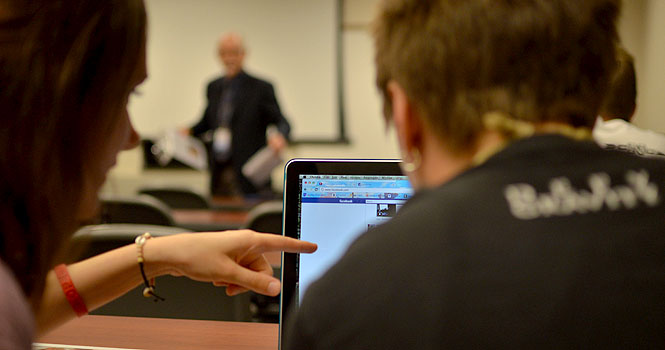Is cheating really worth it?
April 17, 2012
It’s nearing the end of the semester, so you want to take some shortcuts.
Maybe instead of studying for that big test, you decide to hang out with your friends, but reality sets in when you get to class. Your teacher hands a Scantron sheet and test to each student, and you know you’re in trouble as soon as you look at the first page.
Choosing A, B, C or D doesn’t make a difference to you, but passing the class does. The teacher’s pet is sitting next to you and filling out every bubble with confidence exhibited by someone who doesn’t know the definition of procrastination.
You have a decision to make. Do you struggle through and pray for a good grade, or do you cheat off of the test beside you?
“When you cheat, you cheat yourself out of learning and out of a good education,” said English professor Denise Harrison. “College is the time to develop skills for the work world. If you cheat, those skills don’t get developed. There are many penalties for cheating.”
She said it’s also not fair to the students who work hard in class to get the grades they do.
“Even though the number of students who cheat seems to be really high, I do think most students are honest,” she said.
Economics professor Erik Zemljic combats cheating by instituting a no cell phone or laptop policy in his class. Because he teaches large intro-level classes like microeconomics and macroeconomics, he has hundreds of students per semester and large class sizes.
“The biggest difficulty with classes like that would be students copying off of each other and looking at each other’s papers,” Zemljic said.
He creates two different exams in two different colors to help deter the number of wandering eyes during exams. His homework assignments are online, and although he encourages students to work together on those, he said cheating will only hurt them when exams roll around.
“The homework is there so students can practice what we discuss in class and so they can learn,” Zemljic said. “If they cheat on the homework, then they will probably fail the exam and ultimately the class.”
Zemljic said he also teaches a finance class online, and online classes do make it very easy for students to cheat.
“How do we know that the student doing the work is actually the student registered for the class?” He said. “We don’t.”
One freshman exploratory major’s boyfriend is taking an online class for her.
“I’m really bad at math,” she said. “I was failing the first time, and I was pretty desperate. He’s good at math, so he just does the class for me. I haven’t actually logged on once for the class. I’m getting an A, though.”
She said she isn’t worried about getting caught because the class is online.
“What do professors expect for online classes?” she said. “I’m not the only one who does this stuff. Cheating happens all the time. Yes, it is wrong, but the way I see it is, I’m just leveling the playing field. If more people are going to cheat, why should I study and work really hard when other people aren’t?”
She said she knows that cheating is wrong, but she believes that her GPA is more important.
Zemljic said that students doing the work for another student can happen in face-to-face classes as well. If the student registered for the class has a friend go from the beginning of the semester, the professor would never know.
“The only way to prevent that kind of thing is to check IDs,” he said. “In classes where there are 100 people or more, that would be nearly impossible.”
He said that he understands the pressure to do well and that cheating bothers him because it isn’t fair to the students who do the work.
“The penalties for cheating can be really high, and sometimes cheating takes more work than studying does,” he said. “If a professor catches you cheating, they can fail you on the assignment or the exam. Is it worth it?”
Harrison said she actually makes her students sign a contract at the beginning of the semester saying they will not cheat or plagiarize.
“There are two scenarios that I have found about students who cheat,” she said. “The first is students who are oblivious to the rules. They just don’t know or realize or maybe ignore them. The second is students who are so desperate, whether they started on the work late or they are so busy that they cheat or plagiarize and think they can get away with it.”
Harrison said her policy on cheating is that if a student cheats, he or she will be called on it.
The university policy on cheating states that the professor has the right to fail the student on the assignment or even the class. If it is a serious problem, the student can be expelled.
To see the official list of cheating and the punishments, Click Here
Contact Maura Zurick at [email protected].












